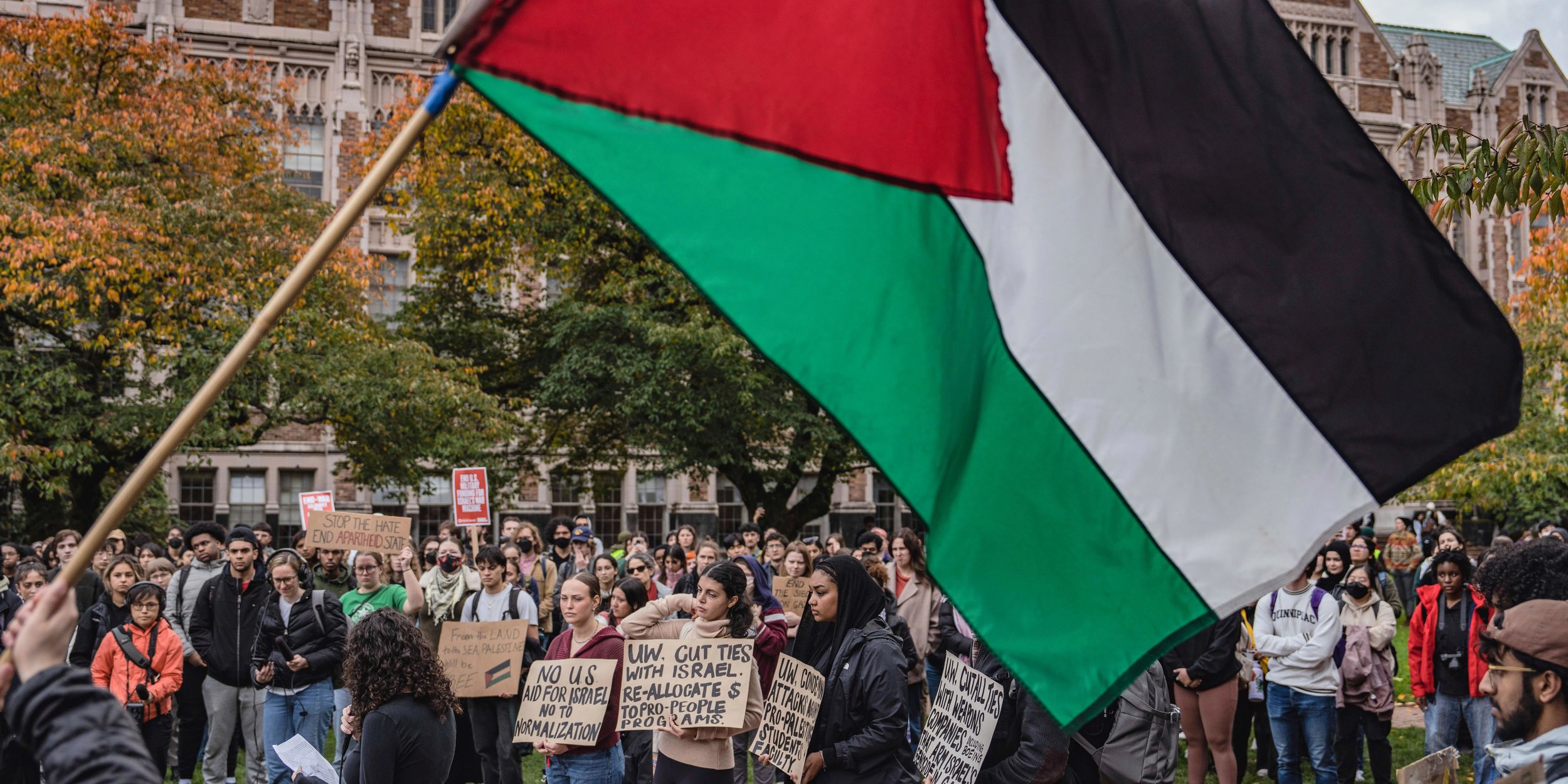THE SENATE CONDEMNS STUDENT GROUPS AS BACKLASH TO PRO-PALESTINIAN SPEECH GROWS



Protesters gather at the University of Washington during a nationwide wave of student walkouts in support of Palestine on October 27, 2023, in Seattle. Photo: Chin Hei Leung / SOPA Images/Sipa USA via AP Images
“Do we risk losing our careers over an ephemeral social post that doesn’t save a single life in Palestine?”
ON FRIDAY, THE U.S. Senate passed a unanimous resolution condemning what it called “anti-Israel, pro-Hamas student groups” across the country following a day of walkouts. Hundreds of students, led by Students for Justice in Palestine and Jewish Voice for Peace, walked out of classes at Columbia University, Princeton University, New York University, and dozens of other colleges in what they described as a demand for a ceasefire in Gaza and end to U.S. military support to Israel. The Senate resolution condemned student groups for ostensibly supporting Hamas as part of a broader government and corporate pushback on protests over the war.
As the conflict intensifies, disputes are spilling over from campuses and government into many workplaces as well. Recent weeks have seen pressure by government officials against student activist groups, the creation of public blacklists in multiple industries, and a wave of politically motivated firings over people’s publicly stated views on the conflict.
“We are seeing people being fired from their jobs, being investigated by HR over their social media posts or conversations with colleagues, and having job offers rescinded. There is a clear trend that people’s jobs are being targeted right now,” said Dima Khalidi, the founder and director of Palestine Legal, an advocacy organization that seeks to preserve the civil rights of supporters of Palestinian rights in the United States.
Khalidi said that her organization has dealt with roughly 2,200 cases of speech suppression between the years 2014 to 2022. Yet in the last two weeks alone, they have fielded 300 new requests for legal assistance, a figure that usually matches their level of requests during a full year. “There is an exponential increase in the need for legal support,” she said. “It is a direct result right now of the kind of incitement that our own elected officials are engaging in, as well as the failure of universities and employers to push against pressure.”
Due to the obvious religious, cultural, and ideological fault lines, the Israel–Palestine conflict has always been a wedge issue for free speech advocates in the United States. But recent events have exposed a gaping chasm in perspective as a tidal wave of speech suppression has been met with a largely muted reaction, or even active support, from elected officials who normally depict themselves as champions of free speech. Florida Gov. Ron DeSantis earlier this week ordered Students for Justice in Palestine groups to shut down over recent protests in solidarity with Palestinian nationalism that he described as supporting Hamas.
A FULL ACCOUNTING of the speech suppression across multiple industries would be difficult given the incredible scope of retaliation, which expands daily. But across the media and technology sectors, the arts, academia, and even generally nonpolitical industries like aviation and public relations, there has been an obvious effort to threaten, ostracize, and remove individuals from jobs based on their stated views on the subject.
In recent weeks, the editor-in-chief of the nonprofit scientific journal eLife, Michael Eisen, was forced to resign after sharing an article from The Onion satirizing public indifference to Palestinian civilian deaths; a top Hollywood talent agent, Maha Dakhil, was removed from the board of her company for suggesting on Instagram that a genocide was taking place in Gaza; and numerous journalists engaged in nonpolitical coverage, as well as ordinary corporate employees both in the United States and beyond, have faced reprimands and dismissals over their statements on the war.
In one of the most high-profile and egregious instances of retaliation, the head of the major global technology conference Web Summit was forced to apologize and resign after posting on X, formerly known as Twitter, that “war crimes are war crimes even when committed by allies, and should be called out for what they are.”
There have been a few cases of genuine prejudice and hate speech underlying these incidents. But the vast majority of recent retaliation appears to be based on what is considered protected speech and advocacy in normal circumstances. These attacks have extended from corporate America deep into the cultural world as well. Numerous writers have had their events canceled or been forced to shift venues based on past or present statements they have made deemed to be supportive of Palestinians or critical of Israel, including the political analyst and author Nathan Thrall and the novelist Viet Thanh Nguyen, who was scheduled to speak at 92NY.

